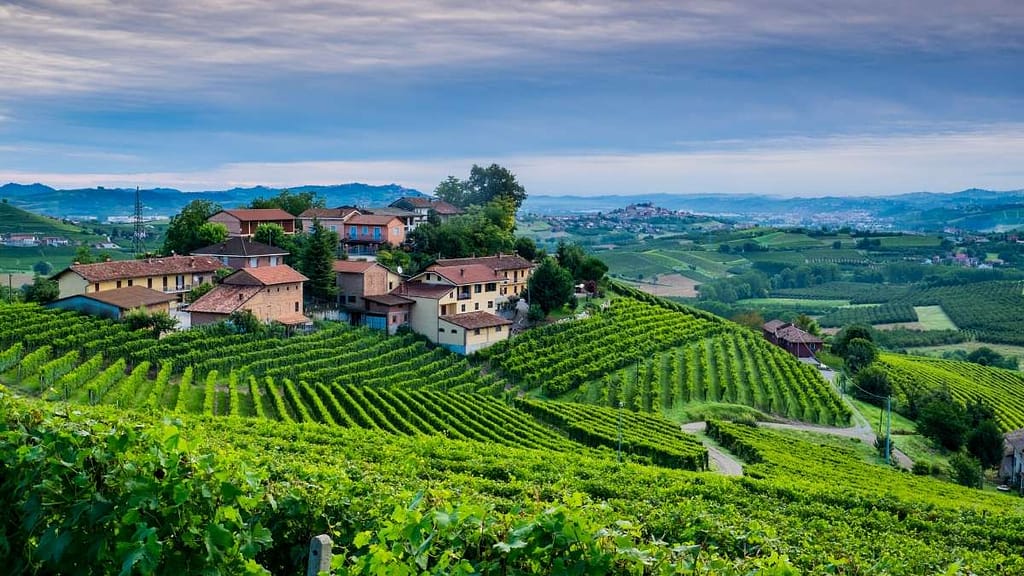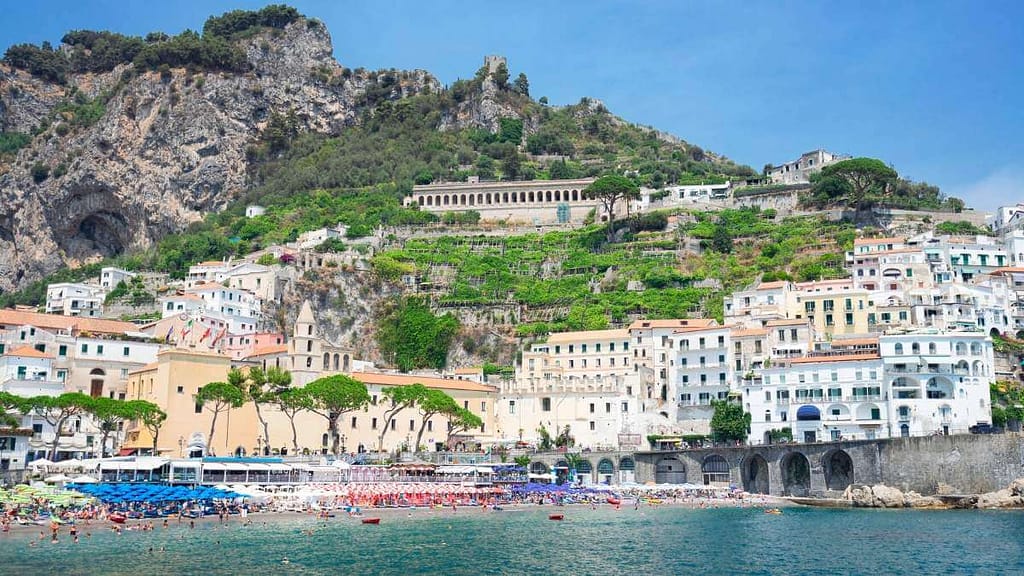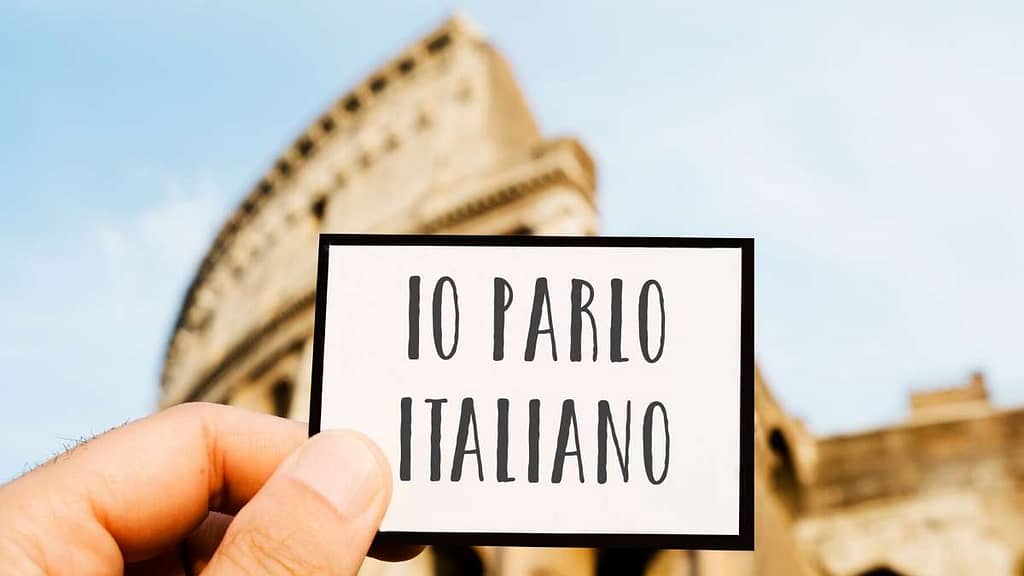Let’s be honest, the Italian dolce vita way of life is a tempting concept. It’s easy to imagine yourself surrounded by the charm and history, drinking wine, eating pasta and stuffing yourself with Italian pastries to your heart’s content. While the cities of Rome, Milan and Florence are easy to picture yourself in, let’s look at the pros and cons of living in a small Italian village.
This post may contain compensated links. Find out more info in our DISCLAIMER.
The pros of living in a small Italian village
Living in a small Italian village can be ideal. The truth is there are probably more people living in small Italian towns than most people imagine. After all, not everyone can live in a big city.

Health benefits
Whether it’s the rolling hills of Tuscany, on top of rugged mountains, or beachside, small towns offer plenty of fresh air. The ideal climate and fertile soil produce food that tastes not only great but also is good for you.

Here in Campagna, the rich soil from the mighty Vesuvius produces supersized fruit and vegetables that taste as they look. It also helps that Italy has banned the use of GMO products and pesticides. It’s hard to find things that taste bad.
People in small Italian villages follow the traditions of their ancestors. The way they make things hasn’t really changed much, which means it’s healthier for you.
Great landscapes
Italy is a beautiful country, no matter where you look. Small Italian villages are usually located in picturesque spots with killer views. Mountains, beaches, vineyards and olive groves are everywhere you look. What’s not to like?
I love looking out at the mountains in the distance. They look so different depending on the time of day and the weather. Sometimes they are covered in thick fog, dark clouds and mist. At other times, they glisten in the sunshine and bewitch you at sunset. It’s easy to see their appeal.

Shimmering waters, vast sandy beaches and rocky shores also offer their charms to locals and tourists alike. Italians love their beach holidays, flocking to the shores in droves for weeks at a time. There is no good reason not to join them.
Peaceful life
Life in small Italian villages is laid back. The hustle and bustle is a foreign concept here. You definitely won’t find yourself being rushed and in a hurry. It’s quite the opposite. The locals linger in the town square, gossip at the local bar or chat with people they pass by. Even the local street dogs sleep lazily in the shade.
There is no urgency here. There might be some activity in the morning as the stores open, and people get their fill of groceries and gossip. A stop at the local coffee shop for a pastry and a caffeine shot is part of the routine.

The local siesta time starts in the early afternoon, and all is quiet until early evening when things pick up again for a few hours. Loud music and rowdy crowds won’t keep you awake at night. Most likely, you’ll become accustomed to the chirping crickets, dogs barking, and the odd rooster crowing in the distance.
History of small Italian villages
Even the smallest Italian villages are steeped in history. Be that ruins of a castle, old churches or other hidden gems; there is plenty to see. It might seem odd that there would be so much even in the smallest place until you look at the country’s history itself.
Before the unification of Italy, the area was home to numerous city-states, all fighting each other. The segmented political structure, combined with the Catholic Church’s power, guaranteed that every little place fought for power. This was especially true between the church and secular bodies hence why even the smallest town has its share of churches, no matter what the population.

As the states fought, the castles and fortifications from the past proved useful for protection. Frequent earthquakes also forced locals to reuse the materials for rebuilding and maintaining the look and feel of the past. Of course, you can also find some Roman ruins lying around. Now that is history.
Small knit communities
As with any small place, you tend to know who your neighbours are. That becomes very handy when you need a recommendation or are looking for someone to provide a service. Locals know who does a good job and whom you should avoid. Of course, they probably have a friend or a relative that can help you out too.

That familiarity also means it’s a safe place. You can be guaranteed that your place is under the watchful eye of your neighbours, whether you like it or not.
Proximity to other towns
Small Italian villages are closely connected to others around them. This makes it very convenient during festivals, events and other entertainment options. It seems that they all take turns, be that fireworks or a celebration, and everyone is welcome.
The proximity of the different small towns almost resembles the different neighbourhoods of big cities. You can get your coffee here, your groceries over there and party totally elsewhere. There is a chance something is happening in one of the places around you.
The cons of living in a small Italian village
To some, life in a small Italian village might sound like the perfect place. However, some drawbacks come with it, so read on before you pack your bags and run off to the countryside.
Everyone knows your business
The problem with small villages is that everyone knows everyone and everything about them. They know your relatives, your business and your daily comings and goings. Another downfall of that is gossip. With a laid-back life, there is a lot of time for socializing and talking about everyone else.

Small-knit communities are not always welcoming to outsiders either, especially if you’re a foreigner. Be prepared for curious looks and nosy questions from the locals. When you’re an out-of-townie, everyone knows it. Prepare to be measured up by the locals, suspicious of your motives. Some might even try to swindle you, so be aware of sudden new friends who want to help.

Nicknames are a common thing in small Italian villages. Quite often, locals and visitors receive affectionate monikers that stick with them for life. Sometimes they make sense, and sometimes they don’t. Just go with it.
Limited access to services
As with any small place, the number of services and amenities available to you is limited. You might have to go to a different town if you’re looking for a specialized service like a doctor or a lawyer. The selection available locally will always be tiny in comparison to what you find in a bigger town.

The government services might also be limited and operate on reduced hours/days. Things like garbage pickup, recycling and other services are not on par with larger places. The lack of spay and neuter programs results in homeless animals roaming the streets, which is downright depressing.
Car dependant
Public transit is also something small Italian villages lack. Services might be sparse and sporadic, which is why you need a car to get around. While parking might not be that challenging, getting around small and narrow streets is a challenge in itself.
Driving off major highways also means reduced lighting, which can be quite hazardous if you are not familiar with the landscape. It’s always better to have a smaller car to navigate around the narrow and steep hills.
Things like mechanics and gas stations are also spread out, so car maintenance becomes very important. Need to get something fixed around the house? Be prepared to wait a while.
Slow pace
While it might be nice to unwind and take a little break, the easygoing pace might become too slow after a while. When there is no urgency for anything, it takes a long time to get things done. That’s how things are here.

As most places shut down during the day for a few hours, there is little to do but wait until things open up again. Have you missed getting something during the opening hours? No worries, tomorrow is another day. This type of life can become frustrating to people used to a faster, more efficient pace. Alas, such is life in a small Italian village.
Not much to do
Having too little to do can be frustrating as well. There are only so many places to go to for entertainment. However, if a routine is your thing, this might not be a bad thing.

With little to do, it’s no wonder the locals are more engrossed in their neighbours’ comings and goings. Depending on who lives in your town, this could be quite the entertainment.
Final thoughts on life in a small Italian village
Deciding if living in a small Italian village is for you can be tough. It can definitely be more affordable, which will come in handy when choosing to travel more around the country. After all, everything is near. Hop on the bus, train or plane, and you can explore another party in Italy.
In the end, only you can decide which location makes sense for you. Before you settle down permanently, rent a place and feel it out. Leasing is easier than buying a house in a place you hate.
Is the Italian countryside calling your name? Let us know.






